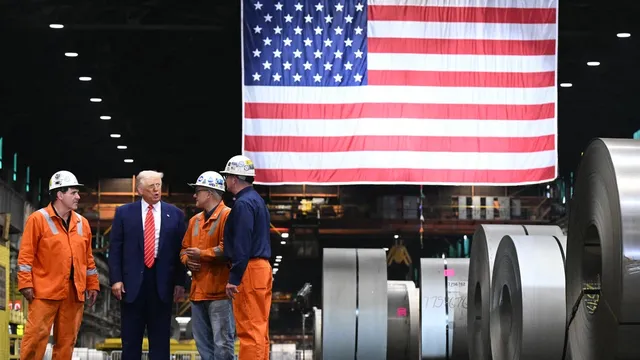
Trump assures U.S. Steel will stay American amid Nippon Steel investment
2025-05-31 23:31- President Trump held a rally in Pittsburgh to announce Nippon Steel's investment in U.S. Steel, emphasizing American control over the company.
- The deal aims to create about 70,000 jobs, but the specifics of the investment have not been disclosed yet.
- Concerns from the United Steelworkers union indicate skepticism about job security and the true nature of the partnership.
Express your sentiment!
Insights
In a rally held in Pittsburgh, Pennsylvania, President Donald Trump announced a deal involving Japan-based Nippon Steel's investment in U.S. Steel, which aims to safeguard American control over the steelmaker. Trump emphasized that the deal, which is part of his administration's prioritization of revitalizing U.S. manufacturing, would maintain U.S. oversight over U.S. Steel and its operations. The partnership is expected to create approximately 70,000 jobs. However, details of the investment, which includes a reported $14 billion, remain unclear, as the companies involved have not yet disclosed specific terms of the arrangement. The United Steelworkers union has expressed skepticism about the deal, arguing that Nippon Steel's initial proposal suggested a complete acquisition rather than a mere investment. They believe that the lack of clarity regarding how much of the stated investment would directly benefit union-represented sites raises concerns about job security for American workers. The proposed arrangement includes provisions for U.S. government oversight, allowing for U.S. board members and the establishment of a 'golden share' that would grant the government veto power over important business decisions. Despite initial opposition, particularly from those fearing the implications for U.S. jobs, some local politicians, including Republican Senator David McCormick, have voiced support for the plan. They argue that the investment and partnership with Nippon Steel could help solidify U.S. Steel's presence in the American economy while revitalizing local operations. The partnership has been framed as a way to leverage foreign investment for the benefit of American manufacturing. Trump's shift in stance comes after the previous administration had blocked Nippon Steel's attempt to acquire U.S. Steel, citing national security concerns. This recent rally and investment announcement seem to signal a significant turnaround in the government's approach to foreign investments in critical American industries. Whether this partnership will indeed lead to the promised job creation and economic boost remains to be seen, as the uncertainty surrounding the deal continues to fuel discussions among industry leaders and labor unions.
Contexts
The partnership between Nippon Steel and U.S. Steel represents a significant collaboration in the steel manufacturing industry, highlighting the need for innovation and efficiency in a competitive global market. Established with a mutual understanding of each other’s strengths, this alliance aims to leverage the advanced technologies and operational efficiencies of each firm. The primary goals include increased production capacity, enhanced product quality, and reduced environmental impact through the adoption of sustainable practices. By merging expertise, both companies seek to address the challenges of fluctuating steel demand and rising operational costs, which have been pressing issues for the sector. As part of their strategic initiatives, Nippon Steel and U.S. Steel have committed to investing in state-of-the-art manufacturing facilities that integrate new technological advancements. This is expected to not only streamline production processes but also to promote the development of high-strength steel products that are essential for various applications including automotive and construction sectors. The partnership also aims to respond to the evolving needs of customers by offering a broader range of products that meet stringent safety and performance standards. In addition to manufacturing efficiencies, the partnership will focus on sustainability. Both companies have acknowledged the growing demands for environmentally responsible manufacturing practices, driving a commitment to reduce carbon emissions. This may include investments in renewable energy sources and the implementation of circular economy principles to better manage resources and waste. By prioritizing sustainability, Nippon Steel and U.S. Steel aim to not only fulfill regulatory requirements but also to position themselves as leaders in responsible steel production. As of now, the partnership is still in its early stages, with plans for significant developments ahead that will further enhance the collaboration between the two giants. This partnership is expected to reshape the landscape of the steel industry, offering insights and advancements that could influence other sectors as well. The ongoing efforts to foster innovation and sustainability set a strong foundation for a successful long-term relationship that benefits both companies and their respective stakeholders.